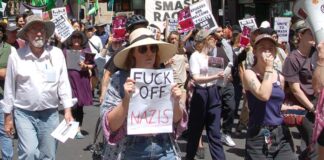The Greek economy is in a depression. The austerity measures demanded by the troika have made it worse. Nationally one in four Greeks are out of work. Those with jobs fair little better: Greek bosses are determined to trash conditions and drive down pay.
Greek workers are not just passive victims—they have been fighting every step of the way. Greece has been rocked by massive general strikes, rallies, and occupations. The crisis may be deepest in Greece, but the resistance is fiercest.
But progressive struggle is only one of two twins that are born in crisis. Reaction, too, has reared its head in Greece. Amid deprivation and social decay, fascism has found new momentum.
In the June elections the Nazi party Golden Dawn won eighteen seats and 7 per cent of the vote. In a poll published in November they are now the third most popular party. Their electoral rise has been rapid—in 2011 Golden Dawn polled at less than 1 per cent of the national vote.
Officially, Golden Dawn presents itself as “nationalist”, rather than fascist. But it puts little effort into maintaining this illusion: their banner resembles a swastika; they make Nazi salutes at meetings and rallies; and their leader—Nikolaos Mihaloliakos—praises Hitler and denies the Holocaust.

Golden Dawn’s publications call for the compulsory sterilisation of the disabled, drug addicts, and other carriers of “mutant genes”. The party calls for gay pride marches to be banned. As recently as 2007 their magazine has had Hitler on the front cover.
Spawn of crisis
Golden Dawn exploit the real insecurity and despair created by the economic crisis. They direct people’s frustration and anguish at immigrants. Their cry is “Greece for Greeks alone.” Party stickers bear the slogan: “Get the Stench out of Greece.”
In the major cities, attacks by Golden Dawn thugs happen daily. A man was bashed and stabbed outside a petrol station when he told members of Golden Dawn he was from Pakistan. In September, a gang of fascists raided a market in northern Athens, and attacked shopkeepers who couldn’t prove they were Greek. In October, fascists beat an Egyptian student with iron rods. He survived, but lost an eye.
Golden Dawn’s rise has to be put in the context of a crisis in mainstream politics. As successive governments have implemented austerity, support for the traditional political parties has collapsed.
Greece’s Labor-type party, Pasok, use to win more than 40 per cent of the primary vote. They were obliterated in the last election, and recent polls show their support has collapsed to 7 per cent. Support for the ruling conservative party, New Democracy, is also at record lows.
The mainstream parties’ commitment to austerity put them at odds with the majority of Greek people. To deflect attention away from their own policies, they blame migrants for unemployment, the collapse of services, and rising crime.
At a New Democracy rally, Antonio Samaras—now prime minster—claimed that immigrants were the “tyrants in society.” Other New Democracy MPs spoke of an “invasion” of illegal immigrants. This has legitimised the racism of the far right.
Golden Dawn has enormous support amongst Greek police. Fifty per cent of police voted for them in the June elections. At rallies police have protected fascists who have attacked demonstrators. They have stood by while people have been beaten in front of them. After a demonstration, police detained and tortured 15 anti-fascist activists. In an interview in The Guardian, a senior police officer described how the state had decided not to crack down on Golden Dawn, preferring to “keep them in reserve”.
Employers, too, see uses for Golden Dawn. A Pakistani community leader observed, “if an employer wants to blackmail you, he threatens to call Golden Dawn.” As the state struggles to contain the labour movement, Greek capitalists will increasingly collaborate with fascists to smash the resistance.
But Golden Dawn’s rise is contested. After the June elections, anti-fascists held a demonstration to protest the election of fascist MPs. On the August 24, thousands of migrants rallied around Greek parliament. They held placards with slogans “No Islamaphobia” and “Neo Nazis out!’ Unions have begun to pass motions resolving to stop the fascists. A new anti-fascist organisation has been set up, and held a conference this month to plan actions across Greece.
The second general strike in Greece since the radical left party Syriza narrowly lost the election in June took place over the 7-8 November, and Greek workers will join a transnational general strike across Southern Europe on November 14.
Defeating this Nazi menace will require the deepening of this struggle. This can point the way towards a real solution to the crisis: workers solidarity across borders and socialist democracy from below.
Hal Hewson





